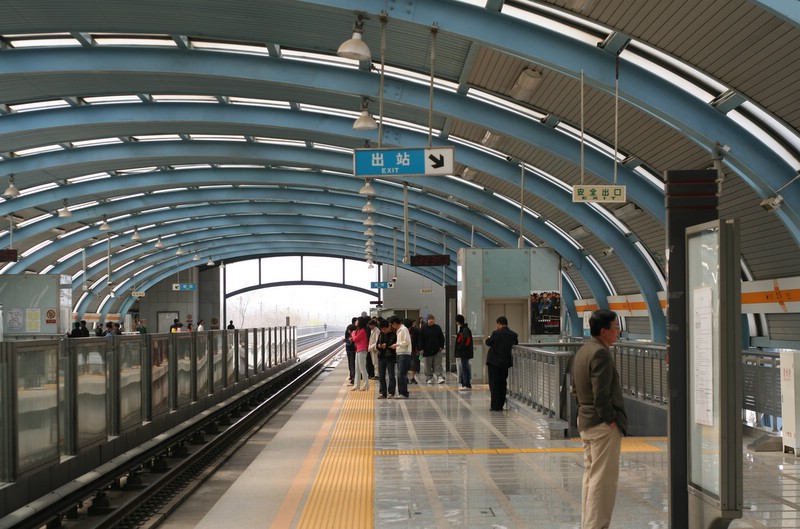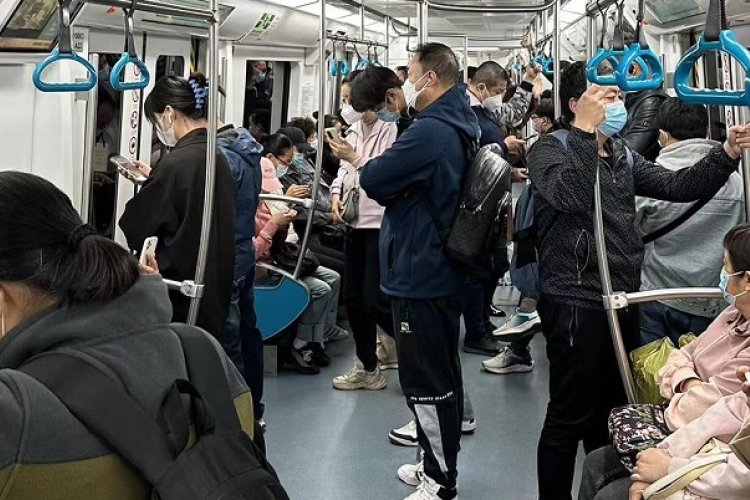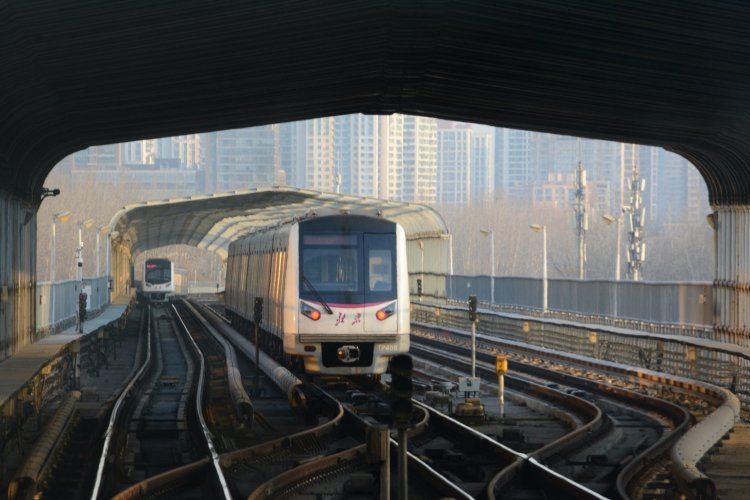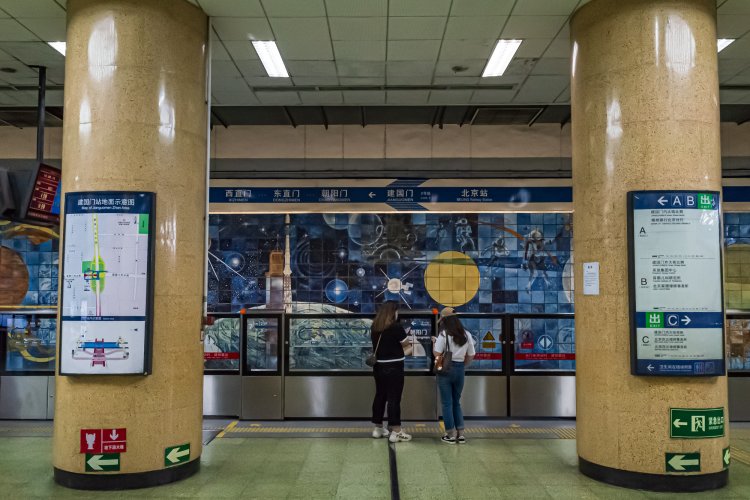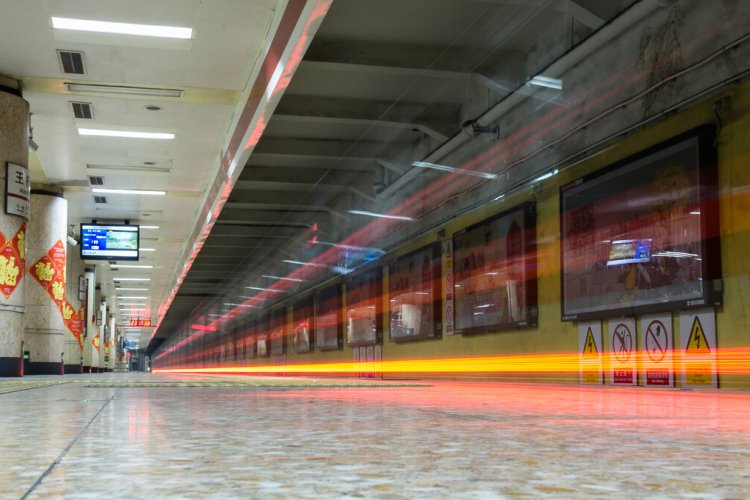Beijing Subway Lost USD 558 Million in 2013
On Monday I traveled over 30 kilometers in Beijing on public transportation, spending RMB 4.4, with most of the distance and RMB 2 of the fare used on the Beijing Subway. One thing's for sure: those days will soon be over.
The flat RMB 2 fare that is so popular among Beijingers, which was already set to rise sometime in the second half of this year, lost the city USD 558 million in 2013, according to The Wall Street Journal's China Real Time Report. Operational costs and expansion of the system cost Beijing RMB 5.33 billion in 2013. Just to break even, a subway ticket would have to be priced at RMB 6 per ride, triple its current rate.
With a distance-based system likely to be implemented, Beijing commuters could see their travel costs rise significantly. Although a cap of RMB 5 for distances longer than five kilometers has been proposed, the municipal government has yet to finalize its plan and the pricing.
We adore the Beijing Subway and use it to come to work almost every day, and while the need for a fare increase is obvious, not all of the reasons behind it are. Complaints that fares need to rise because the subway is too crowded miss the bigger picture: aside from the price, the Subway's greatest advantage is that it avoids surface traffic and is therefore generally a faster way to commute. Driving passengers back up to surface routes just means that problem will at the very least not improve.
Prior to the opening of new subway lines, such as Line 10 in July, 2008, many Beijingers believed that the new options would lead many car owners to stop driving and take public transportation instead, which we can say with great confidence did not occur. So what happens when some commuters find themselves priced off of the Beijing Subway, and then only have the bus (or possibly bicycle) as a transport option?
Regardless, with losses in the hundreds of millions of dollars, it's clear that fares will be going up, and that will be that.
Photo: Wikimedia
Related stories :
Comments
New comments are displayed first.Comments
![]() mtnerror
Submitted by Guest on Mon, 07/21/2014 - 10:08 Permalink
mtnerror
Submitted by Guest on Mon, 07/21/2014 - 10:08 Permalink
Re: Beijing Subway Lost USD 558 Million in 2013
When someone's idea is to NOT do it like the other 90-some percent of other operators are doing it, the onus is on you. Your way of operating is hemorrhaging public funds, both with interest piling up and massive subsidies required to keep your ride artificially cheap. This combo is creating a deficit a mile high. The interest on the debt is hampering future public projects and hamstringing future generations and the needs of tomorrow. I love it how you picked only Chinese culture which you think is less deserving of public funds than public transport (and many would disagree with you on that). Nothing on the handful of other options I mentioned. You're always in a race to oversimplify things, or you really just can't stand that you're going to have to pay for a greater chunk of your individual transport decisions than the public. Beijing "has the worst rode [sic] system and worst traffic in the world"? You have obviously not been to Mumbai, or Manila, or even Washington...it's comical how you think Beijing's traffic and road conditions and subway ops can't be compared to any other metropolis, China or elsewhere. A classic reply from Squid.
![]() squid
Submitted by Guest on Fri, 07/18/2014 - 21:23 Permalink
squid
Submitted by Guest on Fri, 07/18/2014 - 21:23 Permalink
Re: Beijing Subway Lost USD 558 Million in 2013
the more I hear you talk about the subway, the more ridiculous you become.
You have in in your mind, that they absolutely must charge for distance (because that is what other cities do!) so you are just going to fight to find any rationale you can think of. "Oh GOD it will be so great when they charge for distance, it will be Euphoric, my Shangri-La. My penthouse magazine of fantasies, man its going to be so great! "
Beijing is not other cities, they have perhaps the worst rode system and worst traffic in the world. If the government has to help spend money to help lesson the traffic problem, great! That is what good government is for. they don't need to spend money promotion Chinese culture, Chinese culture can promote itself fine. Beijing has two serious issues, traffic, and pollution. Subsidize this!
Keep the subway cheap, spend money on this! Its a great investment in the cities future!
![]() mtnerror
Submitted by Guest on Fri, 07/18/2014 - 12:58 Permalink
mtnerror
Submitted by Guest on Fri, 07/18/2014 - 12:58 Permalink
Re: Beijing Subway Lost USD 558 Million in 2013
Do you guys have amnesia? You must have forgot the countless articles which talk about the reason why current fare is only "2 yuan" is due to heavy subsidies. I am not in favor of "charging" more because of some insatiable greed I have, but the no.'s don't lie. There's a global recession going on and municipal, provincial, and national gov'ts are overdue. They need cash -- yesterday. @ Sciency: I will take your comments for what they are. You have a lot of guessing in your statements, little facts. No one has ever stated riders in Tongzhou who go to west side will have a fare of 16RMB...I think you pulled that out of your...go to Shanghai Metro's website, for example, and you'll notice for even the greatest of distances the rate is approx half of your scare tactic number. I do not agree with the notion today's BJ subway system is alread complex. It's one of the easiest to figure out. Nor do I beleive implementing distance-based far would be something that only BJers have an inability to understand.
The subway is largely built for residents, not tourists, who use to get to and from work and school. For the percentage of tourists who need a few extra minutes to figure out which route they should take and happen to have done zero research before they came to town, I'm not too worried. Overwhelming riders possess a yikatong and travel the same route day after day. I do not buy the fear that all of a sudden riders will be trapped behind inept tourists who can't figure out the subway fare and back up the turnstiles until well after the lunch hour, ruining whatever morning plans you had. And this is NOT something which I have pulled out of my ---, as it's based upon observation in SH, HK, Paris, NYC, Chicago, and many other cities which employ distance-based fare. Any problems that exist with ground transport should not always be laid at the feet of the subway operators, expecting them to fix whatever auto issues exist above ground.
You also have to rememeber BJ subway operaters have already stated they want something like 23 lines running by 2020, and 30 beyond that. The operators can't keep riding the taxpayer's back and fare shouldn't -- and financially it's already been proven it can't -- be so articially low due to high subsidies. I don't know why people are so comfortable paying distance-based fare for all other modes of transports EXCEPT the subway -- cheapskates? Have your cake and eat it too?
And yes, Squid, there will continue to be lines built which will increase revenue, but it's also quite evident in your recent threads and posts long ago that you haven't the faintest understanding of a balance sheet. By expanding the no. of lines and no. of stations, yes, operating revenue will increase, but so too will operating costs. You can't run in the red for the next 15 years and expect any board of directors or municipal comptroller to be OK with that.
Of course the operators and the city aren't expecting an immediate payback on their investment. Yes, building new lines and stations and developing in-country technology for the cars (Line 7 will feature all Mainland technology, the first in China) is an investment and subway sytems take years before the capital is returned -- this is not unique to Beijing, nor to subway systems. But it's quite evident the guys who run the no.s' have shown the continued fare system is proven to NOT be sufficient -- not merely for investments, but for operating costs.
![]() squid
Submitted by Guest on Thu, 07/17/2014 - 23:56 Permalink
squid
Submitted by Guest on Thu, 07/17/2014 - 23:56 Permalink
Re: Beijing Subway Lost USD 558 Million in 2013
Put another way, when Apple spent 3 billion for Beat Audio this year, does that means they lost 3 billion? of course not, they added value to the company.
The same thing happens with the subway, that cost they spent on new lines is not a loss, its an investment. And with new lines and new stops obviously they will hve increased revenue as well.
![]() squid
Submitted by Guest on Thu, 07/17/2014 - 23:45 Permalink
squid
Submitted by Guest on Thu, 07/17/2014 - 23:45 Permalink
Re: Beijing Subway Lost USD 558 Million in 2013
Arvi89,
That 558 million includes the cost of construction of new lines being added. No budget in the world would expect to make back all of the money spend for a 30 or 40 year usage in one year.
That would be like airlines wanting to buy 500 new planes, and then hoping to get back all of their expenses for those new planes in the same year they bought them. Impossible.
Without new construction, their budget would be 1/6 of that or less.
![]() Arvi89
Submitted by Guest on Thu, 07/17/2014 - 19:00 Permalink
Arvi89
Submitted by Guest on Thu, 07/17/2014 - 19:00 Permalink
Re: Beijing Subway Lost USD 558 Million in 2013
558 million USD not RMB 
That would be around 3.5 billion yuans, that's why they need to increase by more than 1 
![]() squid
Submitted by Guest on Thu, 07/17/2014 - 15:47 Permalink
squid
Submitted by Guest on Thu, 07/17/2014 - 15:47 Permalink
Re: Beijing Subway Lost USD 558 Million in 2013
Sciency,
I agree with you completely . There is no doubt that if they implement a distance fare it is only going to complicate matters dramatically, and mean bigger, slower moving crowds. Three yuan per trip seems reasonable to mean, and would provide enough revenue.
Also, new line construction will not go on forever, eventually once they are finished building revenues are going to go up dramatically.
I can't understand what mtnerrors obsession with making people pay so much to ease city traffic is, but its weird I think.
![]() Sciency
Submitted by Guest on Thu, 07/17/2014 - 15:02 Permalink
Sciency
Submitted by Guest on Thu, 07/17/2014 - 15:02 Permalink
Re: Beijing Subway Lost USD 558 Million in 2013
Yeah there's really no need.
They ran 558 million into the red in 1 year. But the Beijing metro hosts 1.84 billion annual passenger rides.
Thus an increase of 1 yuan per passenger will be 3x what's required to solve the deficit problem. No need to implement a complicated system that drives long-distance commuters to overload the buses.
![]() felicity
Submitted by Guest on Thu, 07/17/2014 - 14:43 Permalink
felicity
Submitted by Guest on Thu, 07/17/2014 - 14:43 Permalink
Re: Beijing Subway Lost USD 558 Million in 2013
I can't find thumbs up icon.. But I agree with you.
![]() Sciency
Submitted by Guest on Thu, 07/17/2014 - 14:38 Permalink
Sciency
Submitted by Guest on Thu, 07/17/2014 - 14:38 Permalink
Re: Beijing Subway Lost USD 558 Million in 2013
Another reason to keep the rates low regardless of distance is as the article mentioned to releive the burden on ground transport.
Imagine someone commuting from Tongzhou to West Beijing daily. If their daily transportation fee suddenly rises from 4 yuan to 16, they will start further clogging up the streets and buses. The city should try to keep as many people using the subway system as possible. (So I don't have to deal with them while I'm on my bike :P) That means keepigng the rates low and not penalizing people for distance.
When I first came to this city there were only two lines, 1 & 2, and I as I recall the rate was 3 yuan -a decade ago. They lowered it to 2 yuan to keep more people using the system. I don't think raising it to 3 again would discourage too many people from using it now, but charging higher rates for distance certainly will.
![]() Sciency
Submitted by Guest on Thu, 07/17/2014 - 14:23 Permalink
Sciency
Submitted by Guest on Thu, 07/17/2014 - 14:23 Permalink
Re: Beijing Subway Lost USD 558 Million in 2013
There's nothing contradictory about my statement. Almost every time I use the system, someone in front of me or next to me is dawdling about the machine trying to buy a ticket and I have to show them how to do it. In fact it's very simple, you hit the "1 ticket" button and insert your money. But still.... they have problem after problem.
The new system is gonna require them to select their destination on a map. That leaves it open to
1. More time and problems getting their ticket. (If they can barely figure out how to purchase the flat-rate ticket, how do you expect them to handle something more complex?)
2. Inputting the wrong destination, causing the exit turnstyle to reject their ticket.
Both of which are going to cause delays and backups. That's a fact.
There's no "educating" them either. That other cities use a distance based system doens't matter. The Beijing subway system is extremely complex now. Also people here are more mindless when performing tasks than other places cuz it's dumb-dumb city. And that needs to be accounted for.
Besides, who goes short distances on the subway? It's got to be very few people. For the time it takes to walk in and out of a station and wait for the train and travel on it, or transfer trains or the like, it's probably just as fast to walk the distance of couple stations or take a bus.
![]() mtnerror
Submitted by Guest on Thu, 07/17/2014 - 09:06 Permalink
mtnerror
Submitted by Guest on Thu, 07/17/2014 - 09:06 Permalink
Re: Beijing Subway Lost USD 558 Million in 2013
@Sciency: So you use it infrequently but have helped "many Chinese and non alike?" It's one or the other. If the former, then you have anecdotal experiences and I could just as easily find someone with an opposing story to tell. If the latter, then the collective experiences must not be bad enough to purchase a yikatong and avoid the confused tourist. Anyways...Beijing attracts tourists, and just like tourists in SH and HK and Tokyo and Washington, life will carry on despite the deer in the headlight looks one might see. Turnstiles will turn, folks will get to their end destination. The operators can also do things to educate folks at each of the stations; they can have arrows on the floor denoting which turnstiles are for yikatong users, which are not. The one-time use tickets are typically used by people who use the subway infrequently (including tourists); otherwise, the time savings of a yikatong are too signficant to pass up. It wouldn't surprise me if SH's ridership no.'s were very similar to BJ's. With that in mind, if they can find a way to do it there, then I am confident it can once again be done here. It's not rocket science. If the system was so complicated, then countless cities in CH and around the world would not be doing it.
![]() Sciency
Submitted by Guest on Thu, 07/17/2014 - 06:56 Permalink
Sciency
Submitted by Guest on Thu, 07/17/2014 - 06:56 Permalink
Re: Beijing Subway Lost USD 558 Million in 2013
@mtn error: You are giving them way too much credit. I use the system very infrequently and hence must purchase a ticket when I do. Invariably some machines will be down (not accepting coins/bills) and I'll be waiting behind some novice endlessly flipping through menus on the machine. I've had to instruct many chinese and non alike how to purchase a ticket, soas to get one of my own.
Add a distance-based fare to that, and it's gonna be a mess. People will just be cluelessly muddling around on the machines for intermidably long periods, like they're at the ATM checking their balance three times, or the counter of a fast food restaurant trying to order. Or anywhere else they can cause backup.
And what happens when the passenger tries to exit at a station that isn't programmed on the ticket? Like buys the cheaper fare accidently on-purpose and then travels a more distant destination on it to try to save a kuai or two? He'll be clogging up the turnstiles is what.
No. People are just too retarded. They should just raise the rate to 3 yuan and call it a day.
![]() squid
Submitted by Guest on Thu, 07/17/2014 - 01:20 Permalink
squid
Submitted by Guest on Thu, 07/17/2014 - 01:20 Permalink
Re: Beijing Subway Lost USD 558 Million in 2013
Ah no, mtnerror, not only me!
![]() mtnerror
Submitted by Guest on Wed, 07/16/2014 - 23:11 Permalink
mtnerror
Submitted by Guest on Wed, 07/16/2014 - 23:11 Permalink
Re: Beijing Subway Lost USD 558 Million in 2013
@Squid: you made it seem like you, and not the article, were the only source on heaven and earth which mentioned the costs of building new lines. I don't know what was misleading about the article. I have answered your question in the past. The gov't provides a basket of goods from the tax revenue generated by the populace. Health, education, public transport, national security, environmental protection, promoting Chinese culture, saving pandas...they're all important. It just so happens the subway system has an outdated, inept operating model and it needs fixing. Only you seem to think it should be let to a paltry 2 yuan. Only you think someone riding 15 stops' worth should pay the same as someone riding 2 stops. Only you think Beijing is incapable of you operating a solvent subway, incoporating distance-based fare like all the cities I mentioned and many, many more.
![]() squid
Submitted by Guest on Wed, 07/16/2014 - 20:54 Permalink
squid
Submitted by Guest on Wed, 07/16/2014 - 20:54 Permalink
Re: Beijing Subway Lost USD 558 Million in 2013
Did you read my post mtnerror, or did you just not understand it? The article talked about the operating costs being in the red, PRECISELY BECAUSE OF THE COST OF BUILDING NEW LINES RECENTLY! Did you not understand what I wrote concerning how this is not a reasonable way to calculate one years operation cost, when the cost for a new line is not a one year return.
I suspect you have some kind of brain contusion and you are hoping that the added costs for people from Tongzhou coming into the city are going to help fund your surgery.
I asked you a long time ago, what is a better thing for the government of Beijing to spend tax dollars on, than the subway. So far you have refused to answer.
![]() mtnerror
Submitted by Guest on Wed, 07/16/2014 - 09:18 Permalink
mtnerror
Submitted by Guest on Wed, 07/16/2014 - 09:18 Permalink
Re: Beijing Subway Lost USD 558 Million in 2013
@Squid: The article mentions it -- just not in the headline. READ the article, where it tells you a plenty about the costs associated with constructing new lines and you won't be mislead. Here's another article pointing out the the way system is now is BROKEN; are you jumping on board? Seven years without an increase...tell me, what in this town has not increased in price during that time, and b) why do you think the subway is immune to this? Operating costs will continue to go up; that much can be guaranteed.
@Sciency: I'm confident the newly-arrived residents, suburb dwellers and tourists of Beijing can figure it out, considering Chendgu, TJ, SH, SZ, GZ, etc. don't have a flat rate. Give BJers more credit than you are now. Confusion by a few doesn't need to ruin it for the rest. The remedy is helpful, intuitive maps and guides and friendly station helpers, not running from the problem. Sticking to a flat rate penalizes those who take the subway for a few stops and rewards those who think they can ride all the way out to the 'burbs and pay the same rate. They wouldn't be able to pay a flat rate if it were a car, taxi, bus, pedicab, or bike getting them to their destination, so why is the subway somehow immune to this?
@Stephen: People should be paying for this "greatest advantage" of not having to sit thru traffic; no more or less than what is required to at least not run in the red. It's a nice thing not to do, and the price of such a convenience should not be kept artificially low to the degree that is so that people in their cars can drive around less encumbered. When drivers get on the national highways, they pay for such a privilege of driving fast without as much traffic. If the subway system was built for no other reason than to let the Audi A6s roam about more freely, then increase the vehicle registration and renewal fees and have them help subsidize the subway -- the money has to come from somewhere and the gov't has been bleeding far too much for far too long. Let's get on board with all the other subway operators in China. There was a battle of ideas at the time when BJ used to have distance-based fare. The results are in, the flat fare lost terribly and now we have additional no.'s revealing that.
![]() Sciency
Submitted by Guest on Tue, 07/15/2014 - 20:44 Permalink
Sciency
Submitted by Guest on Tue, 07/15/2014 - 20:44 Permalink
Re: Beijing Subway Lost USD 558 Million in 2013
They'd better stick with a flat-rate, whatever that may be. As it stands now, people get all confused at the machines trying to figure out how to purchase the flat-rate 2 yuan ticket. If they complicate it with different rates, it's gonna be a severely backed-up fustercluck at the ticket machines.
![]() squid
Submitted by Guest on Tue, 07/15/2014 - 19:17 Permalink
squid
Submitted by Guest on Tue, 07/15/2014 - 19:17 Permalink
Re: Beijing Subway Lost USD 558 Million in 2013
I think the article about the Beijing subway loses is extremely misleading. If you add the cost of adding a new subway line as part of your annual expense budget, of course the revenue generated is going to seem very lopsided. The cost for building new lines isn't expected to be paid for in one years revenue, that would be ridiculous.
New construction of lines should be a whole separate category of expenses, which the company recoups after many years of service. If next year they built no new subway lines, does that mean their revenue would automatically go up by several billion?
If there was no new lines added Beijing subway may well operate at a surplus even only charging 2 yuan.
Validate your mobile phone number to post comments.

